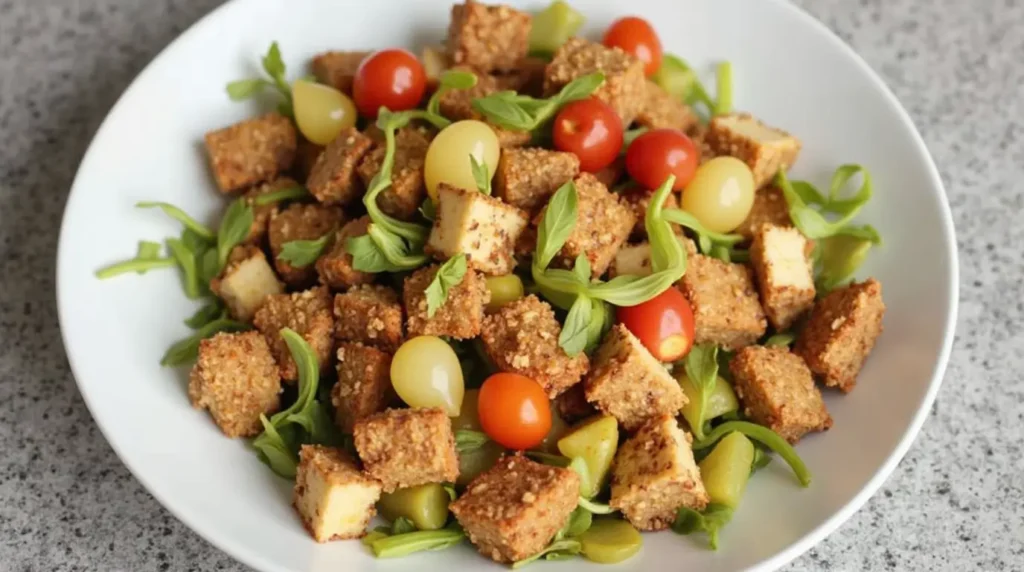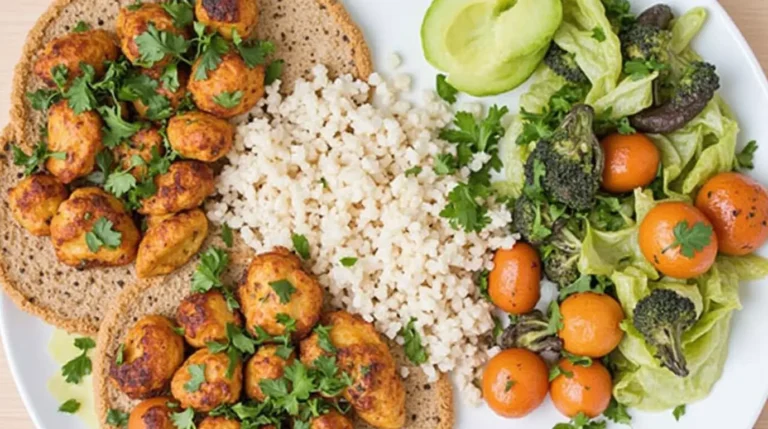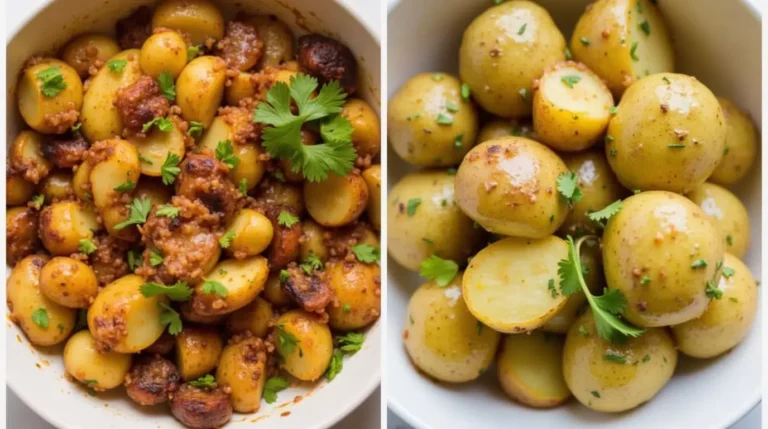Introduction
Polycystic Ovary Syndrome (PCOS) is a widespread hormonal disorder that affects many women globally. One of its most challenging aspects is insulin resistance, which can cause weight gain, difficulty losing weight, and an increased risk of type 2 diabetes. Fortunately, a well-planned diet, including PCOS lunch recipes, can play a crucial role in managing PCOS symptoms, stabilizing blood sugar levels, and supporting weight management.
In this post, we’ll explore scientifically-backed PCOS lunch recipes designed specifically to help manage insulin resistance. We’ll also cover key nutrients that should be included in a PCOS diet, the best ingredients for hormonal balance, and meal prep strategies to simplify your routine.
Table of Contents

The Link Between PCOS, Insulin Resistance, and Diet
How Insulin Resistance Affects PCOS
Insulin is a hormone responsible for regulating blood sugar levels. Many women with PCOS suffer from insulin resistance, a condition where their bodies have difficulty utilizing insulin properly. This results in heightened blood sugar levels, increased fat accumulation, and stronger cravings for carbohydrates and sugary foods.
When insulin resistance remains unaddressed, it can contribute to weight gain, hormonal imbalances, and fertility complications. A nutrient-dense diet is one of the most effective ways to regulate insulin levels and support overall metabolic health.
Why Low-Glycemic Foods Matter
The glycemic index (GI) measures how quickly a food raises blood sugar levels. High-GI foods, such as white bread, pasta, and processed snacks, rapidly elevate blood sugar levels, triggering significant insulin spikes. On the other hand, low-GI foods, such as leafy greens, quinoa, and lentils, help maintain steady blood sugar levels, making them ideal for PCOS management.
Essential Nutrients for a PCOS-Friendly Diet
A PCOS-friendly lunch should contain fiber, protein, and healthy fats to promote satiety and balance blood sugar. Here are the key nutrients to include:
- Fiber: Regulates digestion and blood sugar levels. Found in quinoa, lentils, and leafy greens.
- Protein: Keeps you full and stabilizes energy levels. Found in chicken, fish, tofu, and legumes.
- Healthy fats: Reduce inflammation and aid hormone production. Found in avocados, olive oil, and nuts.
Best Ingredients for PCOS-Friendly Lunches
To create delicious and balanced PCOS-friendly lunches, it’s essential to incorporate the right ingredients. Here are some must-haves:
1. Fiber-Rich Foods
Fiber slows down digestion, helping to stabilize blood sugar levels and curb cravings. Some great options include:
- Quinoa
- Lentils
- Chickpeas
- Leafy greens (spinach, kale, arugula)
- Sweet potatoes
2. Anti-Inflammatory Healthy Fats
Healthy fats are essential for hormone balance and reducing inflammation. Consider adding:
- Avocados
- Nuts and seeds (almonds, chia seeds, flaxseeds)
- Olive oil
- Fatty fish (salmon, sardines)
- Coconut oil
3. High-Quality Protein Sources
Protein helps with muscle building, blood sugar control, and prolonged satiety. Best sources include:
- Chicken breast
- Turkey
- Fish (salmon, tuna, cod)
- Tofu and tempeh
- Eggs
4. Anti-Inflammatory Superfoods
Chronic inflammation can exacerbate PCOS symptoms. Including anti-inflammatory foods in your diet can alleviate symptoms and improve overall health:
- Turmeric
- Ginger
- Garlic
- Berries
- Green tea

5 Best PCOS Lunch Recipes for Blood Sugar Balance
1. Quinoa & Chickpea Power Bowl
A fiber-packed meal rich in plant-based protein, ideal for managing insulin resistance.
Ingredients:
- 1 cup cooked quinoa
- ½ cup chickpeas, drained and rinsed
- 1 cup mixed greens
- ½ avocado, sliced
- 1 tbsp olive oil
- 1 tbsp lemon juice
- Salt and pepper to taste
Instructions:
- Combine quinoa, chickpeas, and mixed greens in a bowl.
- Drizzle with olive oil and lemon juice.
- Top with avocado slices, salt, and pepper.
- Mix well and enjoy!
2. Salmon & Avocado Salad
A protein-dense, omega-3-rich salad supporting hormone health.
Ingredients:
- 1 grilled salmon fillet
- 2 cups mixed greens
- ½ avocado, sliced
- 1 tbsp pumpkin seeds
- 1 tbsp olive oil
- 1 tbsp balsamic vinegar
- Salt and pepper to taste
Instructions:
- Arrange mixed greens in a bowl.
- Add grilled salmon and avocado.
- Sprinkle with pumpkin seeds.
- Drizzle with olive oil and balsamic vinegar.
- Toss and serve.
3. Lentil & Spinach Soup
A hearty, fiber-packed soup perfect for meal prep.
Ingredients:
- 1 cup cooked lentils
- 2 cups spinach
- 1 small onion, chopped
- 2 cloves garlic, minced
- 1 tsp turmeric
- 4 cups vegetable broth
- 1 tbsp olive oil
Instructions:
- Heat olive oil in a pot and sauté onion and garlic.
- Add lentils, vegetable broth, and turmeric.
- Simmer for 15 minutes.
- Add spinach and cook for another 5 minutes.
- Serve warm.
PCOS Meal Prep Strategies for a Stress-Free Week
- Batch cook grains like quinoa and lentils to save time.
- Pre-cut vegetables for quick meal assembly.
- Store meals in glass containers to maintain freshness.
- Prepare dressings and sauces ahead for easy flavor enhancements.
- Keep healthy snacks ready, like hummus with veggies or Greek yogurt with chia seeds.
Lifestyle Tips to Support PCOS Management
- Stay hydrated with water, herbal teas, and infused drinks.
- Prioritize stress management and quality sleep to lower cortisol levels.
- Engage in regular movement such as strength training and yoga.
- Avoid processed foods, refined sugars, and trans fats.
Conclusion
Effectively managing PCOS and insulin resistance starts with smart food choices and a well-structured meal plan. By incorporating PCOS lunch recipes and adopting healthy lifestyle habits, you can support your hormonal balance, improve insulin sensitivity, and boost overall well-being.
Which recipe are you most excited to try? Share your thoughts in the comments!






